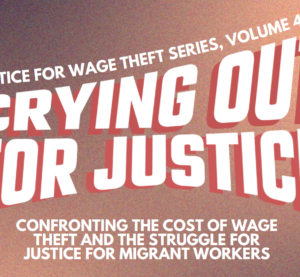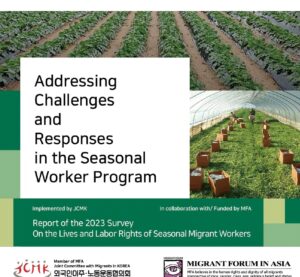Collective Punishment for Individual Act
— July 21, 2008BAHRAIN — It is interesting to note that Bahraini civil society organisations have been in the forefront in taking the government into task. Nabeel Rajab, the vice-president of the Bahrain Centre for Human Rights, has observed that ‘such an action completely contravenes its (the government’s) responsibilities and commitments to human rights’.
He felt that ‘the ban, even worse, expulsion of Bangladeshi workers from Bahrain, because of certain crimes committed by Bangladeshi individuals is a blatant form of discrimination’, writes CR Abrar.
(Note: The Bangladeshi worker in question, convicted of the slaying of a Bahraini fashion designer, was executed by firing squad at 5:00am on June 4 in the presence of the judge who had sentenced him to death, according to the Gulf Daily News.)
THE Gulf state of Bahrain has recently subjected itself to a new wave of criticism. Otherwise known to be a liberal state in promoting migrant rights that recently won a coveted seat in the United Nations Human Rights Council, Bahrain’s latest decision not to issue visas to Bangladeshi workers in the wake of an alleged murder of Bahraini in the hands of a Bangladeshi have been subjected to widespread international criticism.
The proposal of a seven-member Al Alasa bloc of Bahraini MPs to expel 90,000 Bangladeshi workers from the Gulf state has drawn pervasive condemnation from civil society institutions across Asia, including those in the state of Bahrain itself. The proposal was made as a reaction to alleged killing of a Bahraini man by a Bangladeshi mechanic. Press reports suggest the mechanic felt aggrieved at the low payment that he received from the Bahraini customer. The altercation that ensued led to physical violence and ultimately the death of the customer.
The incident took place at a time when a section of the Bahraini media is engaged in a canard against Bangladeshi workers portraying them to be socially undesirable. In the aftermath of the incident some members of the Bahraini parliament demanded the government to expel all Bangladeshis from the Gulf state. In the meantime the government of Bahrain has decided not to issue work permits to Bangladeshis. All these have created a situation that made an otherwise law-abiding and hard-working Bangladeshi community in Bahrain vulnerable to xenophobic and racist discrimination and attacks.
We understand from the international media that the Bangladesh government has expressed deep regret about the incident and urged the Bahraini authorities to treat this as an act of an individual. It asked the Bahraini authorities to reverse its position on issuing of visas. We, however, would like to be assured that if the alleged killer had access to legal counsel and was given the opportunity to defend himself under the due process of law. As migrant rights defenders we would also like to know if he had access to interpreter during the course of court proceedings.
The incident, as reported in the press, would convince any sensible person that it was not a ‘premeditated act’ as the prosecution has claimed and on which the fate of the individual rests. The violent act was triggered off in a state of rage, when individuals temporarily lose their sanity; a ground often accepted by the courts for leniency in punishment. Under the circumstances, we urge the authorities concerned to take this into account and lodge appeal to the highest authorities of Bahrain so that a valuable life could be spared. Seeing it as an act of an individual does not absolve the Bangladesh authorities to ensure that the accused gets fair trial.
The rushed decision of the Bahraini authorities has received massive denunciation from human rights activists and migrant support groups across Asia. The Manila-based Migrant Forum in Asia, a coalition of more than one hundred activist organisations, is currently engaged in a campaign ‘to ensure fair and honest legal proceedings’ for the accused Bangladeshi, calling on the Bahraini authorities that ‘the ban on Bangladeshi workers should be reversed immediately and the government should put an end to policies which encourage discrimination, whether it is gender-based, racial, sectarian or national’. It reminded the Bahraini authorities that as a signatory to the International Labour Convention on Discrimination in Recruitment and Professions, which upholds the principle of equality in the workplace, ‘Bahrain should reconfirm its stance against discrimination because of race or sex’.
It is interesting to note that Bahraini civil society organisations have been in the forefront in taking the government into task. Nabeel Rajab, the vice-president of the Bahrain Centre for Human Rights, has observed that ‘such an action completely contravenes its (the government’s) responsibilities and commitments to human rights’. He felt that ‘the ban, even worse, expulsion of Bangladeshi workers from Bahrain, because of certain crimes committed by Bangladeshi individuals is a blatant form of discrimination’. Rajab has demanded that the ban should be reversed as a first step. He felt disappointed that, instead of challenging the unfair decision of the government, the Chamber of Commerce and Industry of Bahrain has called for implementing in a way that it does not affect businesses adversely. He urged the business community to recognise the contribution made by the tens of thousands of workers who are in no way guilty for the crime committed by one individual. Rajab has warned that mainstream Bahraini community should protest ‘against any racism on the government agenda, which exacerbates any tensions between local communities’.
Another rights activist Faisal Fulad of the Bahrain Human Rights Watch Society is against the move to ban a whole nation for one person’s crime. Fulad, a Shura Council member, noted that the proposal of MPs to ban Bangladesh is against Bahraini culture and heritage.
Nabeel Rajab went a step further and put the question that ‘If an American or European had committed the crime instead of the Bangladeshi, would the MPs dare raise their voice against them, forget imposing a ban on their countries?’ A response from the Bahraini authorities to this poignant question would certainly be enlightening.
NOTE: CR Abrar is a Professor of International Relations at Dhaka University



